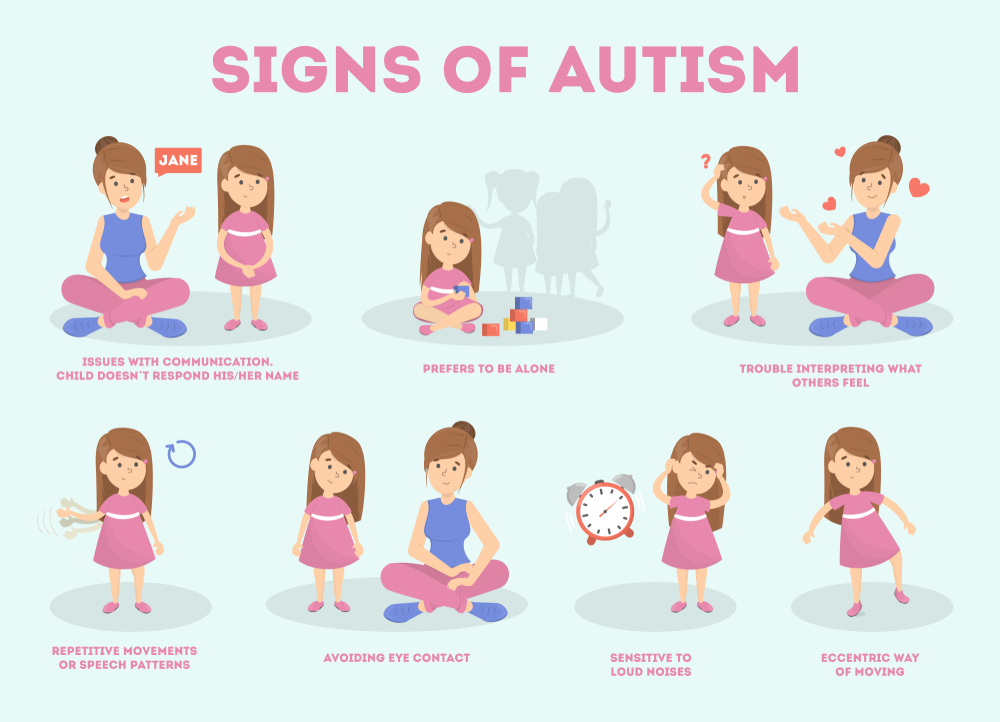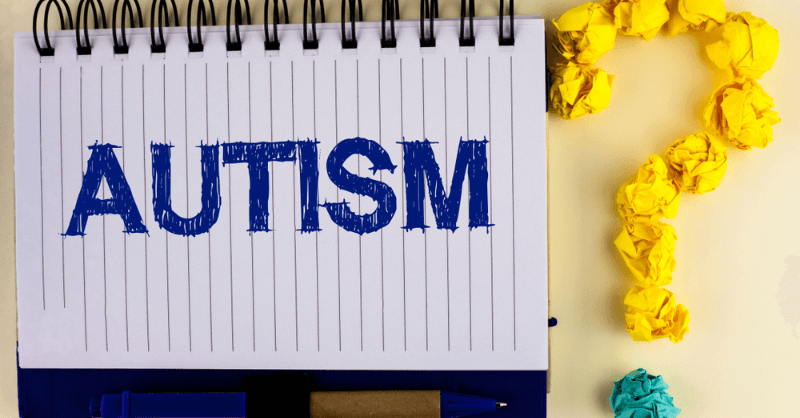Early Signs of Autism, or autism spectrum disorder (ASD), is not one condition but instead refers to a range of conditions which are often characterised by things such as challenges with social skills, the need to repeat behaviours, and speech and non-verbal communication. Currently, 1 in every 100 children in the UK has an autism diagnosis, with work ongoing all the time to ensure that children receive these diagnoses faster to ensure they can start receiving the support they need as quickly as possible.
If you’re a parent of a child with autism, a parent who thinks their child may be autistic, or you’re looking to explore a career which will see you working with autistic children, then it’s vital that you have a complete understanding of autism and how to recognise the early sign of autism.
This comprehensive post is designed to give you a complete understanding of autism in children and what you can do to recognise the early sign of autism yourself.
Recognising the Signs and Symptoms of Autism
Autism can present itself in a number of ways, meaning it can sometimes be hard to recognise or diagnose, to begin with. Lots of people with autism will experience it differently, but here are some of the most common signs and symptoms of autism that you may see when looking out for the early sign of autism.
Common autistic signs and symptoms include:
Is Autism a Mental Illness?
It’s important to recognise that autism is not a mental illness or a disease, and it is not something that can be cured. It simply means that people with autism’s brains work differently, and they, therefore, they react differently to common, daily situations. Autism is classified as a developmental condition and affects how autistic people see the world and how they interact with it.
While autistic people can have good mental health just like anyone else, a recent study has found that around seven out of ten people with autism do experience a mental health condition as well, including anxiety, depression, ADHD or OCD. In fact, anxiety disorders affect up to 42% of people with autism, in comparison to the 3% of children and the 15% of adults in the general population who have some sort of anxiety problem.
Enrol Now: Diploma in Autism
Early Signs of Autism in Babies
As a parent or childcare worker, it’s good to be able to spot the early signs of autism in babies as quickly as possible, as this will help children get a diagnosis and start to receive support as soon as possible. The earlier autism is diagnosed, the more time you will have to adapt and provide the full level of support that your child needs to feel happy and safe in the world.

Here are some of the common early signs of autism you can look for in babies at different stages in their childhood. However, it’s important to note that everyone will experience autism differently, and different children could display a different set of autistic behaviours from each other.
Autism Signs By 3 Months
Autism Signs By 7 Months
Autism Signs By 12 Months
Autism Signs By 24 Months
Why do Children Get Autism?
Autism is not something that children can catch or be given, but rather it is a brain disorder which children are born with or first appears when they are very young. As there is no cure for autism, people with autism will be autistic for their entire lives.
However, autism has no single known cause, and because it is such a complex disorder with a range of symptoms and different levels of severity, there is probably a range of things that could cause autism in children.
Here are some of the areas which have been explored in relation to the early signs of autism:
Several different genes have been found to be involved in autism. In some cases, autism can be related to genetic disorders such as Rett syndrome or fragile X syndrome. Genetic mutations may also increase the risk of developing autism. Genetic mutations can either be inherited from your parents or they can occur spontaneously.1. Genetics
Researchers are looking into the possible effect that environmental factors can have on children and see if these could be linked to autism. This includes things like viral infections, complications during pregnancy, or air pollutants.2. Environmental Factors
The sex of a child can have a lot to do with the likelihood that they have autism, as boys are four times more likely to exhibit the early signs of autism compared to girls. However, this could be due to the fact that girls have to be seen to be better at hiding their autism, and therefore, don’t get diagnosed with it as often.3. Child’s Sex
If a family already has a child with autism, then they are at a higher risk of having another child with autism in the same family. Autism can also affect a number of generations in one family, suggesting it is something that can be passed on to a child from their parents.4. Family History
If children have other disorders, it is thought that these will place them at a higher risk of developing autism. These include the conditions already mentioned above like fragile X syndrome and Rett syndrome, but also things like tuberous sclerosis.5. Other Disorders
If a baby is born prematurely before 26 weeks, then they are thought to be at a higher risk of developing autism.6. Premature Babies
Researchers are also looking into the possible link between children being born to older parents and the higher likelihood of them developing autism, though it needs more study at this time.7. Age of Parents
What Not to do With an Autistic Child
As we’ve said already, autism can be very different for every child, and the early signs of autism which each child displays will be very different. However, there are some things as a general rule which you should avoid doing with children who have autism to avoid confusing them or causing them mental and emotional distress.
Lots of children who have autism are non-verbal, which means they will find other ways to communicate with you. It’s important to pay attention to autistic children even if they aren’t speaking, or you may miss the ways they are trying to communicate with you. 1. Not Listen Just Because They Aren’t Speaking
2. Not Respecting Their Feelings
Autistic children may not be as open with their feelings or be able to express them in the same way as other children, which may lead to you assuming that they don’t have any feelings to express. However, this is usually not the case, and as we mentioned above, it’s important to find the right away to communicate with an autistic child to ensure their feelings are being heard.
[/su_note]
Autistic children can be prone to meltdowns, but it’s important to recognise this is not them being difficult or trying to cause an argument. Instead, it is their way of expressing their pain and frustration. It’s important to know how to support autistic children through these meltdowns, rather than acting like they are an inconvenience for you.3. Don’t Think They Are Trying to Be Difficult
If autistic children are misbehaving, or lashing out in a way that seems like misbehaving, you may be tempted to try and discipline them in a way which has worked for you before with other children. However, it’s important to recognise that autistic children react to a range of social situations in a different way, and may not be able to read your emotions in the same way as other children. That’s why it’s important to alter the way you discipline them to ensure a positive result rather than one which will confuse or upset them. Rather than shouting or punishing them, it’s important that you vocalise the behaviour you expect from them. This could when it comes to things like tidying their room at the end of the day. Make sure they know what they need to do and when they need to do it, otherwise, they may not recognise that what they are doing is wrong or not what you expect of them.4. Don’t Try to Discipline Them the Same Way as Other Children
When children are very small, people often think they don’t understand what is being discussed around them. This may lead to other people bringing up their autism to you in front of them and painting it in a negative light, however unintentionally. It’s important not to talk about autistic children as if they are not there, and as if they don’t understand that you are talking about them. The last thing you want to do is give them the impression that having autism means there is something wrong with them. If other people want to discuss autism with you, ensure that you do it in a matter of fact way rather than making it seem like a difficulty. You should also ensure that you don’t blame all of their negative traits or problems they may have with school or other people on their autism. This will mean that they grow up thinking that autism is a terrible thing to be stuck with, rather than something which just makes you approach the world a bit differently. Make sure you spend time with your child explaining why autism is nothing to worry about and all the positives of being autistic. This will help them embrace their autistic behaviours and grow up knowing that it’s okay to be different.5. Don’t Talk About Autism as a Negative Thing
Can a Toddler Show Signs of Autism and Not be Autistic?
It can be quite common for children to display signs which may appear to be the early signs of autism, but turn out not to be. Things such as walking or talking later than expected may appear to be the early signs of autism, but are actually quite common in young children, as everyone learns and develops at their own rate.
If you think your child is displaying the early signs of autism, then the best thing to do is to seek professional medical advice, and they will help you diagnose if your child has autism or not.
Enrol Now: Autism Training
Early Signs of Autism in Boys and Early Signs of Autism in Girls
While a lot of the early signs of autism are common across the sexes, there can be some difference between how boys and girls display the early signs of autism.
Girls are more likely to try and hide their social challenges at places like school. This is because girls are more likely to try and mimic other social situations and fit in with others. Girls can also become obsessed with forming strong friendships with others, and so will be able to form a bond with a few other like-minded individuals. All this means that other early signs of autism can be missed in girls because they are good at masking the other, more obvious symptoms which would usually be present in children with autism. Unfortunately, this means that girls may go longer without receiving a diagnosis and the support that they need to help them understand their autism.
Girls’ Behavior
While girls are more likely to alter their behaviour at school in a bid to fit in, their behaviour at home will be very different, where they don’t have to worry about controlling their emotions as well. Boys, however, will tend to act the same no matter what situation they are in. This means that teachers are far more likely to raise concerns about boys rather than girls because girls mask their behaviour and outbursts in front of others. This can lead to girls having massive outbursts when they finally get home from school though, as they are exhausted from trying to change their behaviour all day.
Boys’ Behavior
Boys, however, are more likely to withdraw from their class at school or their peer group, which can leave them feeling quite isolated. Boys are also reported as appearing hyperactive and being seen as misbehaving in the classroom, which means that teachers tend to focus on boys with autism more, as their behaviour often has a direct effect on the rest of the class.
Because girls are more likely to force themselves into social situations, they are more likely to suffer meltdowns due to the irritability and lethargy they can feel from participating in situations that actually make them feel quite uncomfortable. However, girls are less likely to have meltdowns in public in comparison to boys. Girls are also less likely to make inappropriate comments or speak at a high volume, which is all part of them trying to hide their autism from others.
While both boys and girls struggle with their communication and interpersonal skills, girls are typically able to do things such as gestures when talking to others and maintain a conversation with another person. Again, this may lead to some missing the early signs of autism in girls as they appear to cope fine with common social situations. Girls also typically display milder versions of the early signs of autism compared to boys.
Finally, while repetitive behaviour is a common early sign of autism, it has been noted that girls typically have milder repetitive behaviours when compared to boys, and simply different repetitive behaviours altogether. Girls are less likely to do things such as lining up and sorting toys, and typically have a lower level of obsessive interest when compared to boys.
Related: How to Become a Certified Autism Specialist
25 Early Signs of Autism All Parents Should Know
If you are worried that your child may have autism and are looking to seek out the proper support for them both at home and in the classroom, here are some of the most common early signs of autism that all parents should know. This will ensure that you can help your child get an autism diagnosis as early as possible!
We hope this post has been informative, and you feel armed with the information necessary to help spot the early signs of autism in your child. If you have any concerns or worries about your child, either at home or at school, the best thing to do is to seek expert medical advice and see what help and support they can offer you.Conclusion
Diploma in Autism
Recent posts
- How to Promote Diversity in Early Years (Learn the Secrets)
- How to Become Good at Math Overnight (is it Really Possible?)
- Safeguarding Responsibilities in Schools: Challenges and Solutions
- How Old Must You Be to Buy Paracetamol
- The Health and Social Care: Stress-Free Service Guide
- What are Functional Skills? From Theory to Practice
- 6 Secrets of How to Become a Baker in 2025 (Career Guide)
- Modal in Maths: Mode, Mean, and More Explained!
- How to Support People with Learning Disabilities?
- 21 Basic Computer Skills You Must Have in 2025


 August 18, 2023
August 18, 2023

















